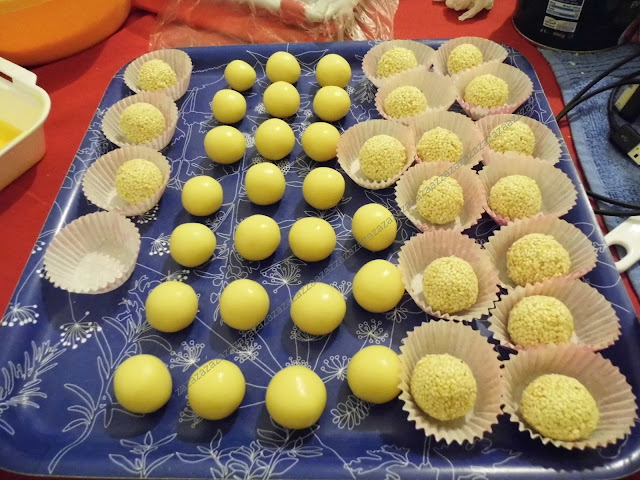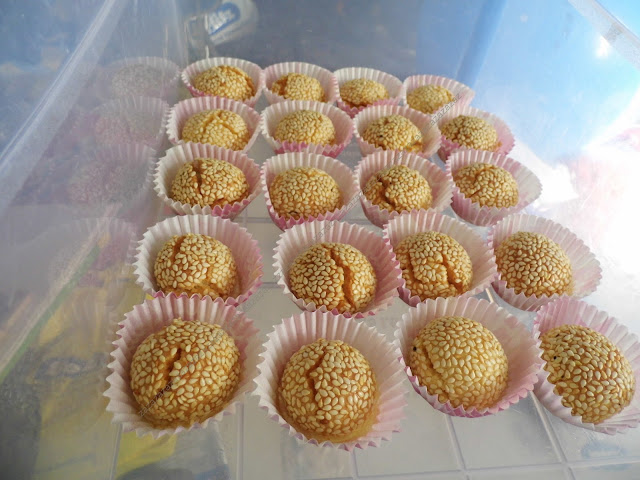 |
| Read: Saha l'idh nwen (Tamazight- Tifinagh alphabet) Meaning: May your Eid be healthy and blessed. |
What's an Algerian Eid like?
Eid in Algiers:
In this entry I intend to give a general idea about How Eid is celebrated in my city - Algiers-.
It would be a little tricky to write about Eid in all Algeria because it's big and contrains many cities and Berber tribes! I wouldn't be able to give each city, village, mountain, dessert, plain, valley, and hill the credit they deserve.
The pre-Eid phase:
In Algiers most people celebrate Eid similarly. A few days before Eid, ladies roll up their sleeves to clean the house inside out and make various kinds of cakes. On Eid's eve, everybody takes a shower and most people -who are Muslim- try to sleep a little early in order to be able to wake up well for Fajr and Eid prayer. Well, not many ladies go to the mosque. There is a significant number of women who do go to the local mosque for Eid prayer, but they still aren't the majority.
Eid prayer and breakfast
In the morning, many men wear their Gandora (a large gown) - some don't wear it though- and head towards the mosques. They are heard from a distance saying their takbeers, Tahleels, Tahmeeds and Tasbeehs. the ladies indoors turn on the TV and follow the men's Eid prayer on live. Simultaneously, they set the Eid table and fix coffee or tea breakfast.
PS: Takbeer = Allaho Akbar. Tahleel: La ilaha illa llah.. Tahmeed= Alhamdoulillah - Tasbeeh = sobhan allah.
The table would be ready by the time men finish their prayer and guests visits begin. On it, there would be many plates full of homemade sweets and cakes, trays containing tea/coffee copper or plastic vaccum flasks and ceramic or glass cups with saucers.
When the men and guests arrive, breakfast is served.
Eid clothes:
Adults as well as children wear new clothes (or their best if they couldn't afford to buy any), fix their hair, ladies put on make up and wear their best perfumes and jewellery.
Eid Henna:
Women and children apply Henna, too. In Algeria henna isn't similar to the one made in the Middle East or Asian Muslim communities. No cones are used, no patterns of flowers and leaves. The most common Henna designs in Algeria are made in the palms of the hands and sometimes fingertips.
So, one can have a circle in the centre of the palm, and all fingertips and nail would be covered too in Henna. Or the person can grab a soft ball of Henna in the palm and closes her hand on it, wrap it and sleep with it. Then, remove it in the morning to get a drawing of a goose or a swan.
Eid greetings:
Most people greet and kiss each other o the cheeks (either 2 kisses or 4, but never 1 or 3 it's considered very rude).
Some people offer Eid cards or gifts. Unfortunately, this beautiful practice is becoming less common nowadays, most people are just satisfied sending a text or calling the person they cannot visit to wish Eid mubarak, which in Algiers dialect would be "saha eidkom" "kul aam wentoma bkheer" (meaning: may your Eid be healthy and blessed and may you be well every year).
Many ladies go to greet their neighbours by knocking on their doors and offering them a plate of homemade sweets.
Eid money: (Drahem al Eid)
As kids go to greet and kiss their parents and family adult relatives, they get some money to buy sweets and treat themselves to little joys. Young ladies and unemployed young men and teens get money, too.
Eid charity: (Zakat el Fitr)
As many Muslims have been fasting for the month of Ramadan, a way to celebrate and offer thanks to God and pray for the fasting as well as good deeds to be accepted is to give out charity on Eid day. It is usually given to the needy families, the mosques, or the local community centres. This charity is given by the working people, those who can afford it.
As many Muslims have been fasting for the month of Ramadan, a way to celebrate and offer thanks to God and pray for the fasting as well as good deeds to be accepted is to give out charity on Eid day. It is usually given to the needy families, the mosques, or the local community centres. This charity is given by the working people, those who can afford it.
Eid meal:
for many people who've fasted the whole month of Ramadan, Lunch on Eid is the first lunch they would have after a month of no lunch. It is also part of our traditions to make a traditional dish during the first day of Eid. That could either be Rechta, Kseksou/Taam (international known as Couscous), Trida, Shakhshoukha, Asvan (aka Tikourbabine)..etc.
Most family members and guests sit at a big table and eat together while catching up on each other's news.
The neighbourhood during Eid:
During the first day, the neighbourhoods during Eid day are almost empty, Most shops clothes as their staff take a break to sit with family. People are indoors visiting families, friends and neighbours. some events for families are held and organised in parks, forests, malls or some private beaches. Family go out on a picnic during the second day or 3rd.
Eid sweets and cakes:
There is a wide range of sweets and cakes, especially those made with nuts.
Here is a list of some names of the most popular cakes/sweets in Algeria.
Makrot Arayech Knidlaat Dziriyaat Mkhabbez Sables
Tcharak msakkar and Aryan Almond fruit Mchouwek el-Yasmina
Nekkach Mchekla Makrot ellouz skendraniyaat El-Jouziya
Baklawa Jeljlaniya (my recipe) Halwet Ettabaa Crokee (my recipe)
Bracelets/ Kaee-keaat Urchins (my recipe) Griwech
Some homemade Eid cakes. (My oven is the size of a mocrowave. Hence, I couldn't give the cakes their original and right size)
 |
| Icing sugar + soft butter + vanilla |
 |
| rolling the Jeljlania |
 |
| Shaping the baby Arayech |
 |
| Tcharak Aryaan, right out of the oven |
 |
| Tcharak Aryaan |
 |
| Cooked and honeyed Jeljlaniya yum! |
 |
| another shot of Jeljlania |
 |
| Makrot cooked in oven (it tastes better when fried) |
 |
| But it's healthier baked in the oven |
 |
| Coating the Arayech |
 |
| and leaving them to dry. |
 |
| My simple humble Eid cakes/sweets |
PS: All recipes by Za on the Gourmandise Blog are mine.
Cheerios
love
xx
Subhannallah; Lots of moral principle to reflect on of EID Subhanallah and Alhamdolilah...Nice post...keep writing
ReplyDeleteThank you for the kind and encouraging words. I'm glad you found something here that you liked. May god bless this space and your life.
DeleteCheers